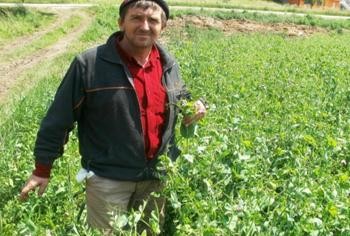Home » Reports & Data » Progress » Transforming Lives » A Seat at the Table: Bosnian Food Products Aim for EU Markets

Muhamed Mehmedovic, dairy farmer, Konjevic Polje-Bratunac.
USAID/Sida FARMA Project
Reaching food safety standards to increase exports
“Thanks to the training I received through USAID, I was quickly able to implement good hygiene practices, reach the ‘extra class’ quality of milk, and thus achieve a 15 percent higher price for the milk I sell to a nearby dairy processor.”
With the exception of fish, Bosnia and Herzegovina (BiH) has been unable to export agricultural products of animal origin, such as dairy products and honey, to the European Union because it could not demonstrate that it meets all of the EU's food safety standards. Restricted access to the EU’s large, higher-paying markets adversely affects more than 20,000 BiH dairy farmers and 10,000 beekeepers.
The problem was further exacerbated when Croatia, BiH’s largest and most important trading partner, joined the EU on July 1, 2013, which effectively cut off all BiH exports of dairy products to the country, to the tune of about $30 million (43 million Bosnian marks) per year.
In March 2013, however, the EU approved BiH’s National Residue Monitoring Plan (NRMP) for poultry, milk, eggs and honey. The approval of this plan is a major achievement and removes the main obstacle for BiH producers to export to the EU. It also represents the final institutional impediment for honey exports.
“The possibility of exporting honey to the EU means a lot to us because we have already had interested buyers from the EU,” said Nijaz Kadirić, director of the apicultural cooperative, Apimed, from Sanski Most.
The EU requires further improvements in the BiH food safety system before poultry, milk and eggs can enter the market, particularly in inspection services and accreditation of laboratories.
USAID, through its Fostering Agricultural Markets Activity (FARMA), is helping to train veterinary laboratories and inspection services to comply with EU standards through the NRMP, which will continue until the FARMA Project ends in 2015. The training is a joint effort by USAID, the Swedish International Development Cooperation Agency (Sida), the Czech Development Agency and the BiH State Veterinary Office, the competent authority responsible for implementation of the plan.
Over the past three years, staff from veterinary laboratories have received training in the Czech Republic and BiH to analyze residues in animal products. As a result, the laboratories are much closer to achieving accreditation for selected methods, and veterinary inspectors are much better informed about their roles and responsibilities in sample collection and inspection of export facilities in accordance with EU standards.
“I believe that our laboratories will soon be able to conduct the required tests due to the support of USAID, Sida and the Czech Development Agency, which will help us—the producers—as we will no longer need to send samples to Serbia, Croatia or Germany for analysis,” Kadirić said.
Amina Magoda, a chemist at the Veterinary Faculty in Sarajevo, said it is rare to participate in a project where laboratory staff can develop new lab methods and have both technical and material support in the process. “Through hard work and such project support, we have developed the conditions for implementing new methods, which strengthened laboratory capacities,” she said.
In the private sector, USAID is also providing training throughout the life of the project to help bring BiH food safety standards in line with those of the EU.
“Thanks to the training I received through USAID, I was quickly able to implement good hygiene practices and reach the 'extra class' quality of milk, and thus achieve a 15 percent higher price for the milk I sell to a nearby dairy processor,” said Muhamed Mehmedovic, a dairy farmer from Konjevic Polje-Bratunac. “No one else has worked so hard to help me as a dairy farmer.”
FARMA assists agricultural associations, cooperatives and small/medium-sized enterprises to improve the competitiveness of BiH agricultural producers. USAID and Sida co-finance the project and collaborate on areas of overlap with the Czech Government. This five-and-a-half-year project ends in February 2015.







Comment
Make a general inquiry or suggest an improvement.